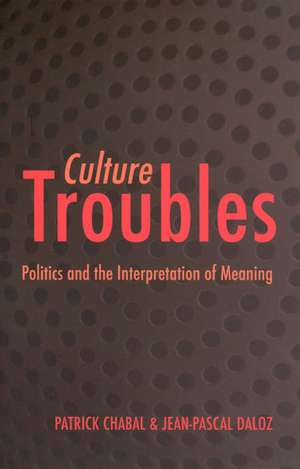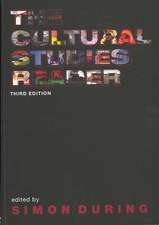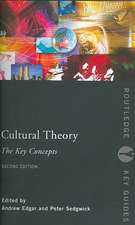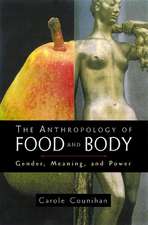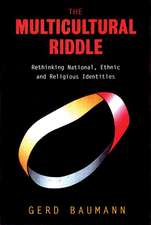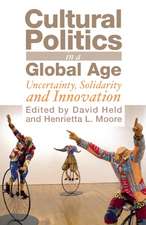Culture Troubles: Politics and the Interpretation of Meaning
Autor Patrick Chabal, Jean-Pascal Dalozen Limba Engleză Paperback – 14 feb 2006
Understanding politics in nations other than your own is a perilous exercise. If you were to read two newspaper articles on the same topic but from different countries, you would likely find two very different interpretations of the same event. But how we think about what is written in our own country seems somehow less distorted, less wrong. So which side is right? And from what reference point can we begin to compare the two?
Culture Troubles is a systematic reevaluation of the role of culture in political analysis. Here, Patrick Chabal and Jean-Pascal Daloz contend that it is unwise to compare different societies without taking into account culture, which in their interpretation is not a system of values, but rather a system of inherited meanings and symbols. This cultural approach, they argue, can attribute meaning to political comparison, and they outline the shape of that approach, one that draws from an eclectic range of sources. Illustrating the sharpness and acuity of their methods, they proceed with a comparative study of the state and political representation in three very different nations—France, Nigeria, and Sweden—to untangle the many ways that culture informs our understanding of political events. As a result, Culture Troubles offers a rational starting point from which we may begin to understand foreign politics.
Culture Troubles is a systematic reevaluation of the role of culture in political analysis. Here, Patrick Chabal and Jean-Pascal Daloz contend that it is unwise to compare different societies without taking into account culture, which in their interpretation is not a system of values, but rather a system of inherited meanings and symbols. This cultural approach, they argue, can attribute meaning to political comparison, and they outline the shape of that approach, one that draws from an eclectic range of sources. Illustrating the sharpness and acuity of their methods, they proceed with a comparative study of the state and political representation in three very different nations—France, Nigeria, and Sweden—to untangle the many ways that culture informs our understanding of political events. As a result, Culture Troubles offers a rational starting point from which we may begin to understand foreign politics.
Preț: 320.80 lei
Nou
Puncte Express: 481
Preț estimativ în valută:
61.39€ • 63.42$ • 51.09£
61.39€ • 63.42$ • 51.09£
Carte tipărită la comandă
Livrare economică 25 martie-08 aprilie
Preluare comenzi: 021 569.72.76
Specificații
ISBN-13: 9780226100418
ISBN-10: 0226100413
Pagini: 362
Dimensiuni: 140 x 216 x 20 mm
Greutate: 0.48 kg
Editura: University of Chicago Press
Colecția University of Chicago Press
ISBN-10: 0226100413
Pagini: 362
Dimensiuni: 140 x 216 x 20 mm
Greutate: 0.48 kg
Editura: University of Chicago Press
Colecția University of Chicago Press
Notă biografică
Patrick Chabal is University Professor at King's College London. Jean-Pascal Daloz is a senior Centre Nationale de la Recherche Scientifique (CNRS) research fellow at the Bordeaux Institute for Political Studies (CERVL) and associate professor in the Department of Political Science at the University of Oslo.
Cuprins
Preface
Introduction: The Politics of Culture
Introduction: The Politics of Culture
Why comparative politics cannot handle culture
What is culture and how does it matter?
Part I. Framework
Introduction
1. Critique of Grand Theory
The universalist fallacy
Red herrings
2. Working Assumptions
The implications of diversity
Against reductionism
3. Analytical Foundations
Understanding differences
Understanding differences
Dead ends
Part II. Approach
Introduction
Introduction
4. Culture and Political Identity
How who we are matters to what we believe....
....but do we do what we are?
5. Culture and Political Order
What power means in its local context
The political uses of culture
6. Culture and Political Change
The myth of timelessness
The fury of modernity
Part III. Method
Introduction
7. Thinking Inductively
The terrain
The analysis
8. Thinking Semiotically
Reading the evidence
Translation
Part IV. Application
Introduction
Introduction
9. The Meanings of the State
Culture and states
States in mind
10. The Guises of Political Representation
An interpretative approach to representation
Ostentation, modesty and legitimacy: representation in context
Conclusion: In Defence of Eclecticism
The illusions of paradigmatic ecumenism
The perennial dilemma of ethnocentrism or the problem of reference
On the merit of conceptual and theoretical eclecticism
Bibliography
Index
